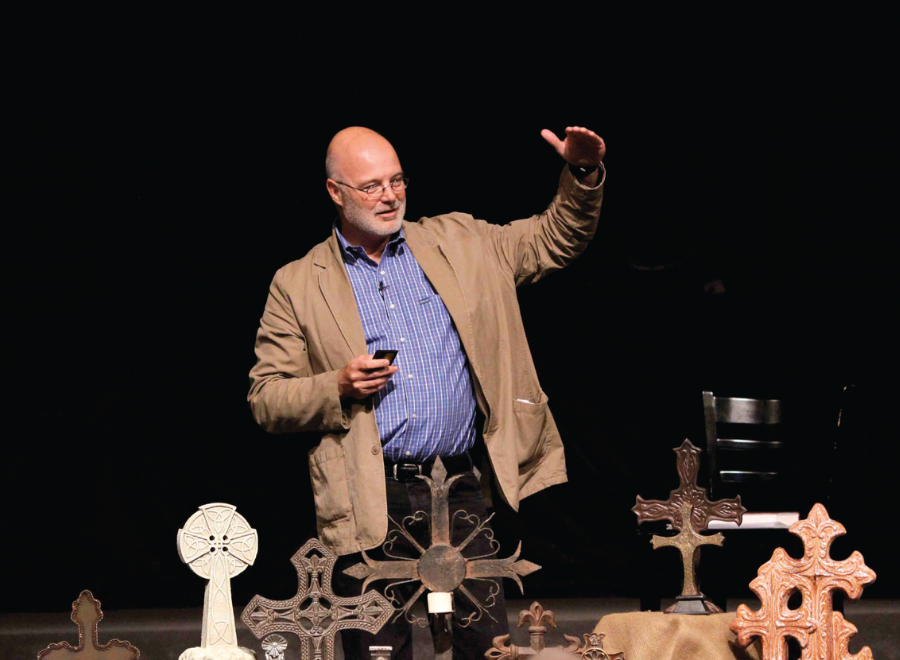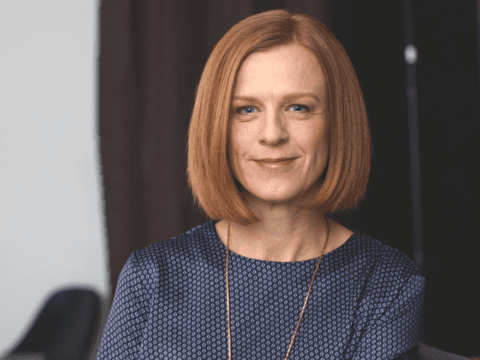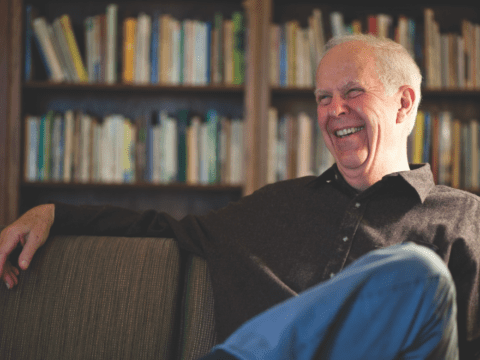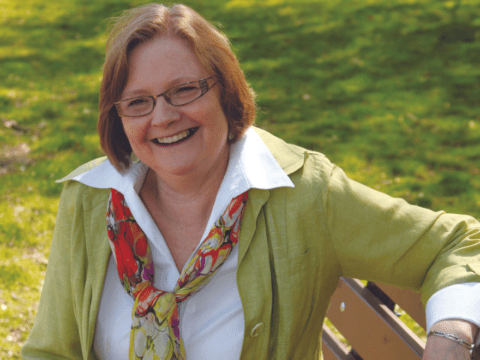It was the combination of freshly baked muffins being served from the centre aisle, kids allowed to run amok and Peter Gabriel’s Come Talk To Me music video kicking off Sunday worship that convinced Brenda Melles of Kingston, Ont., she had found her new spiritual home. Also, heckling was allowed during “teaching time.” Got a question? Shout it out. “I just thought, ‘Yes!’ I felt a sense of freedom and relief. I felt that I could breathe,” remembers Melles, 39. The church is called Next Church, and although it is officially a church-plant of the Free Methodist Church of Canada, the “emerging church” movement is the thick soil from which it grows.
But defining the emerging church movement is like attempting to nail Jell-O to the wall or trying to solve a problem like Maria. Not easy.
The emerging church has no headquarters, no official start date (though some point to the late 1990s), no leader, no particular style of worship, no roster of endorsing denominations, no membership rolls, no edges to bump up against and few theological boundaries. And no, it has absolutely nothing to do with the United Church’s Emerging Spirit campaign.
Yet, United Church members should pay attention. This growing evangelical subculture challenges the tired notion that conservative Christians are forever stuck on abortion, homosexuality and saving souls. In fact, the emerging church movement could break down some of the theological silos that have kept liberal and conservative Christians apart.
The movement has its gurus, the most public one being American author Brian D. McLaren (A New Kind of Christian and A Generous Orthodoxy are pivotal books for the movement). “The term emerging church is a pretty broad term, and I’m sure for some people it is little more than a younger and hipper approach to church growth,” says McLaren. “But for a lot of us, it goes deeper. It is a profoundly theological conversation asking deep questions about the ways in which our understandings of the Christian faith — both liberal and conservative — have been unhealthily enmeshed with a modern, western, rationalist, consumerist, colonial mindset.” Emergers are trying to “disembed the Christian Gospel from that mindset and discover what it can mean and do in the emerging post-modern context,” explains McLaren.
In the emerging church conversation, the word “post” gets used — a lot. Don Posterski is Research Professor of Christianity and Culture at Tyndale University College and Seminary in Toronto: “The emerging church is post-conservative orthodoxy. It’s post-abortion and post-homosexuality. It’s post-moral majority stuff. It’s post-a-whole-bunch-of-things. Evangelicalism just got so narrow. People have crawled out of that prison. They are confessing subjectivity out loud.”
It’s a “growing conversation about an engaged church that understands the contours of culture,” adds Phil Zylla, president of McMaster Divinity College in Hamilton. “It’s a new way of being church that results in a new way of doing.”
The emerging church is not only about form (the kind of songs, the style of preaching) but also the function of the church. Therefore, it is a discussion that moves beyond church-growth strategy, to examine what, why and who the church is in the post-postmodern age.
ANDREW HYDE, 29, IS THE YOUTH and young adult minister for Ottawa Presbytery. Back in university, he and his now-wife also found themselves at Next Church. Hyde has since returned home to the United Church. He uses phrases like “loosey-goosey” (in the most positive sense) and “informal” to describe his experience with the emerging church, and that goes for the theology, too. “Whenever I’ve been in the emerging church context, theology gets downplayed and it’s a lot more about community.” Hyde agrees that the emerging church is something that is hard to nail down.
“It’s a mistake to view it as a movement,” says Eddie Gibbs, professor of Church Growth at Fuller Theological Seminary in Pasadena, Calif., and co-author of Emerging Churches: Creating Christian Community in Postmodern Cultures. “And it’s more than a conversation. It’s a phenomenon. The key issue is that we recognize we are in a missional situation today and the church needs to be re-imagined.” Gibb’s book offers this refreshingly concise definition: “Emerging churches are communities that practise the way of Jesus within postmodern cultures.” Gibbs and his co-author, Ryan K. Bolger, say this is not just another gimmick to reach young people and grow churches. It’s not about what generation you are from at all; it’s about what culture you are living in and how you’re going to engage it with the Gospel.
But key to understanding emerging churches is that unlike some forms of evangelicalism, this is not about winning souls for heaven. It’s about living an authentic kingdom life now and loving people where they’re at, through service, social justice and the building of a Christian community.
Phil Zylla of McMaster says he believes that even though it clearly has some parallels, this is not “old-style social justice. It’s a fresh interpretation of social concern from a spirituality of discipleship with Jesus. Orthodoxy is actually one of the markers that distinguish if you are a part of this or not.”
One can safely say that emerging churches proclaim Jesus as Lord, but things might get a bit fuzzy beyond that. “If orthodoxy is a list of doctrines, then there are certainly some doctrines that are more central across the centuries and others that are more peripheral,” says Brian McLaren. “A generous orthodoxy would have more tolerance for diversity on the peripheral.”
Zylla says that two flashpoints for the emerging church movement are the doctrines of atonement and eternal punishment. Both are typically central to evangelical theology and both are played down within the emerging conversation.
Darryl Dash is a Toronto-based Baptist pastor and emerging church observer who helps run a website called Resonate that flirts with emerging thinking. “They don’t like statements of faith,” says Dash. “They tend to see orthodoxy as fluid. They’re unwilling to be pinned down. They are very holistic and ‘get’ social evil as well as individual sin. In my circles, you don’t always sense that we get that.”
This theme of being holistic is central to the movement. Other markers of the emerging church, according to Gibbs and Bolger, are a deep identification with the life of Jesus; dismantling of the divide between sacred and secular; and living in community.
Of course, the meaning of community has been changed forever by the Internet. Blogging is central to the emerging community. It probably wouldn’t exist in such strength without it. Phil Zylla describes blogging as the emerging community’s “modus operandi.” It drives the movement and often results in the formation of local gatherings of emerging types who have found and strengthened each other via the Internet and subsequent face-to-face gatherings.
Jamie Arpin-Ricci works — and blogs — in downtown Winnipeg. “About three years ago, I started a blog. I wanted a place where I could articulate ideas. As a young Christian leader, there were others my age working in a church where asking certain questions about core beliefs was seen as a betrayal of faith, rather than integrity, which I think it is,” says Arpin-Ricci. “My blog gained popularity, and all of a sudden I was part of this large international conversation.”
It’s a conversation that makes room for dialogue between the evangelical and the mainline churches like few others have. “This questioning of how church has been and a search for something more authentic is a common theme we probably all share,” says Darryl Dash. Arpin-Ricci agrees: “The emerging church does this bridging. There is openness to relationship and partnership. [Some evangelicals] are getting more comfortable dialoguing without fear of a compromise in their theology.”
Brian McLaren believes that where conservatives tend to be rigid in their beliefs and flexible in their methodology, “liberals tend to be flexible in their beliefs and rigid in their methodology. What we need is a mixture of both in our beliefs and methodology. In a real way, liberals and conservatives can help each other seek that new integration.”
Andrew Hyde of the United Church agrees. “My experience of the emerging church has been that, by and large, when it talks about theology it talks pretty orthodox, but it really goes off the chart with how it’s presented, in terms of fluidity and creativity.” Hyde has concluded the United Church is the opposite: “In theology, we’re creative and fluid, but in terms of expression, not so much. I think the United Church could learn how to be more creative.”
Some observers have even wondered if the logical parking spot for the emerging movement is, in fact, the mainline church. After all, one way some emerging congregations re-imagine church practice is by embracing ancient liturgies, hymns and spiritual practices that are old hat for many mainline denominations.
Others dismiss that prediction. Hyde says that in his experience, the emerging church “is not even on the radar screen of United Church people.” So, if it does pull up in the parking lot, it’ll have some explaining to do.
Some say the term “emerging church” itself is already moving out of fashion. There is perhaps one thing you can say for sure about this very real phenomenon: in a movement without walls and halls, you could be part of an emerging church without ever having heard the term.
***
This story first appeared in The United Church Observer’s April 2008 issue with the title “Christianity without borders.”















